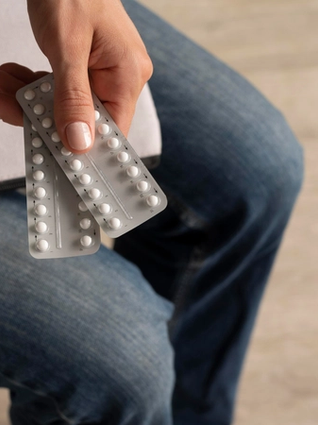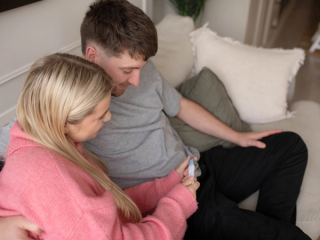
- Home
- Advice Hub
- Conception
- Trying To Conceive
- Coming Off The Contraceptive Pill To Get Pregnant
Coming off contraception to Get Pregnant: All you need to know
Find out what to expect when coming off the contraceptive pill to get pregnant, including how it affects fertility and the time it takes to conceive.
If you're considering pregnancy, one of the first and most important steps is coming off your contraception. Making the decision to start trying for a family is exciting, but it’s natural to have questions—especially around how long it might take for your fertility to return to normal once you’ve stopped your contraceptive method. How long it will take you to conceive, depends on many aspects, but also the type of contraceptive you've been using, as different methods affect the reproductive system in different ways.
Let’s walk through what to expect when coming off various contraceptives, how they impact your fertility, and how to navigate this transition with confidence.
Contraceptives: An Overview
Contraceptives are designed to prevent pregnancy by effecting the process of ovulation, fertilization, or implantation. They fall into several categories, each with different mechanisms and implications for fertility:
- Hormonal methods (e.g., the pill, mini-pill, injection, implant, hormonal IUD)
- Barrier methods (e.g., condoms, diaphragms, cervical caps)
- Non-hormonal intrauterine devices (e.g., copper IUD)
Each method prevents conception in different ways and offers a unique level of effectiveness. They also all have a different timeline for the return of fertility once discontinued.
Let’s look at these different methods one by one:
The combined oral contraceptive (Commonly referred to as The Pill)
The combined oral contraceptive pill contains synthetic estrogen and progestogen, The combined pill works in three ways. Firstly, by preventing the ovaries from releasing an egg and then by thickening cervical mucus making it harder to sperm to swim towards the uterus. It also prevents the lining of the womb from thickening enough to allow for implantation of the fertilised egg.
Coming off the pill:
When stopping the pill, it may take a few months for your fertility to return to normal and for you to have a regular cycle. There is some evidence to suggest that women can be highly fertile in the first month of stopping the pill, however it is more usual that there will be a delay in your fertility returning.
As the pill contains hormones, it is recommended that you stop the pill for a few months before trying to conceive if you can. However, if you fall pregnant quickly, don’t worry as the hormones in the combined pill will not have any impact on your baby or pregnancy.
Progestogen-only pill (Commonly referred to as the Mini-Pill)
The mini pill contains only progestogen and primarily works by thickening cervical mucus and thinning the uterine lining. It may also suppress ovulation in some women and in certain types of mini pill.
Coming off the mini pill:
Ovulation and your fertility can return as early as 48 hours after stopping the mini pill; however, it is also normal for cycles to take a few months to return to normal.
This method is an ideally method if you wish to start trying as soon as you stop the mini pill, however like the combined pill, you may prefer to wait a few months for the hormones to be out of the body. Once you’ve had your baby, the mini pill can also be safely used when you’re breastfeeding, therefore all round, the mini pill is a great method to consider before trying for a baby.
Hormonal Injections
The contraceptive injection, such as Depo-Provera, delivers a high dose of progestogen into the bloodstream to stop ovulation.
Coming off the contraceptive injection:
This method has the longest impact on fertility. It can take 6 to 12 months (sometimes up to 18 months) for ovulation to return.
Whilst the wait may feel frustrating, it presents an ideal opportunity to get ahead with healthy habits to optimise your fertility and future pregnancy and to start taking folic acid.
Hormonal Implants
Implants are small rods inserted under the skin, releasing progestogen continuously to inhibit ovulation.
Coming off the contraceptive implant:
Fertility usually returns quickly—as early as 48 hours but typically within a few weeks—once the implant is removed. Remember, you will need an appointment to have your implant removed by a doctor or nurse.
Vaginal ring and patches
The vaginal ring is a flexible device inserted into the vagina that releases estrogen and progestogen to suppress ovulation. The patch is also a combined method containing oestrogen and progesterone. It is a thin skin toned plaster which is stuck to the skin and changed weekly. Both mimic the hormone release pattern of the pill, providing continuous contraception.
Coming off the ring or patch:
Once removed, hormone levels start to decline. Your fertility and normal menstrual cycles will resume within 1-3 months.
Hormonal Intrauterine System (IUS)
This intrauterine device, like the copper coil, is inserted in the uterus by a doctor or nurse and releases low doses of progestogen locally within the uterus. The IUS mainly affects the uterine lining and cervical mucus, but may also influence ovulation.
Coming off the hormonal IUS:
As with some of the other progestogen methods, your fertility can return very quickly – within 48 hours, of having the IUS removed, however in general ovulation will return by the next cycle.
Copper Intrauterine Device (IUD)
Unlike hormonal options, the copper IUD is non-hormonal and works by creating a sperm-toxic environment in the uterus.
Coming off the copper IUD:
Fertility returns immediately after removal. However, like the IUS, as removal is required by a healthcare professional, you will have to wait for a clinic appointment to have the device removed.
Barrier Methods
Barrier methods of contraception such as condoms, the cervical cap and diaphragm, work by physically blocking sperm from reaching the egg.
Coming off barrier methods:
These methods do not affect hormonal levels. Fertility is unaffected and returns immediately after discontinuation.
Fertility Awareness Method (FAM)
Fertility awareness, commonly called natural family planning is a method of contraception where a woman learns to track her cycle to identify the fertile window using natural fertility indicators such as waking basal body temperature, cervical mucus and the position of the cervix.
Coming off FAM:
If you are using this method as contraception, you can now relax the rules to help you conceive and as you have a great awareness of your cycle already, you are a step ahead!
Side Effects When Stopping Hormonal Contraception
When stopping hormonal contraceptives, your body begins adjusting to its natural hormonal cycle. You may notice some delay in your periods returning or you may experience irregular bleeding or spotting. This is all completely normal and nothing to be concerned about. If however, your periods do not return, or your cycles are lengthy or if you are experiencing heavy and painful periods, don’t delay in seeking advice from your doctor.
Coming Off Contraception: Tips for a Smoother Journey
Here are some tips to ease the transition off contraception:
- Track your cycle: Apps or fertility awareness methods can help you identify ovulation.
- Support your body: Eat a balanced diet, stay active, and manage stress.
- Give it time: It may take several months for your cycle to regulate.
- Seek medical advice: If your periods haven’t returned after 6 months (or 12 months after the injection), speak to a healthcare provider.
FAQs on contraception and getting pregnant
Whilst in general it may take a few months for your fertility to return to normal, some women find that they conceive on the first month of trying to conceive! However, we are all different, so don’t be concerned if this has not happened for you.
There’s no required waiting period; however you may wish to wait one or two cycles to allow the hormones to leave the body, start tracking your cycles, have a healthy lifestyle and commence taking folic acid.
There’s no evidence that you become more fertile long-term, but some women experience a temporary surge in ovulation after stopping birth control. This can slightly increase the chances of conception in the first few cycles.
No, there is no evidence to suggest that contraception impacts on your fertility for the future.
Final thoughts
Coming off contraception is a key milestone in preparing for pregnancy. While each contraceptive method affects your body differently, the return to fertility is usually quick and straightforward. With a little patience, self-care, and the right information, you can feel empowered and supported on your fertility journey.
If you have concerns about your menstrual cycle or fertility after stopping contraception, don’t hesitate to speak with a healthcare provider for personalised guidance.



